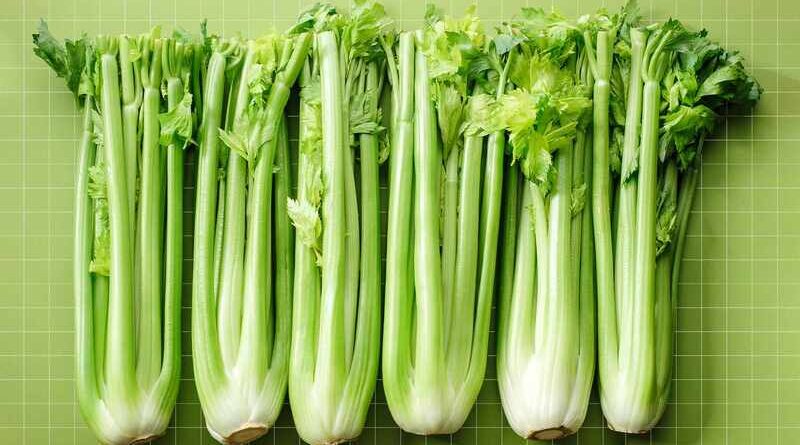Unlocking the Power of Celery: Exploring Delights & Easy Recipes
Crisp and refreshing, celery has been loved for ages for both its many health uses and its adaptability in cooking. This post will discuss the nutritional qualities of it, look at its various culinary applications, and analyze some of its dishes. Come along as we explore the intriguing world of it and learn why it should be a mainstay of both your garden and diet.
Nutritional Value and Health Benefits
It is a powerful nutritional food that is low in calories and rich in water content, making it satisfying and hydrating. Which is high in fiber, vitamins A, C, and K, folate, and potassium, promotes heart, digestive, and hydration health. It may also have anti-inflammatory qualities. It is a useful addition to any diet due to its adaptability in recipes and potential to help with weight management.
| Nutrition | Facts |
|---|---|
| Calories | 14 |
| Protein | 0.7 g |
| Fat | 0.2 g |
| Carbohydrates | 3 g |
| Fiber | 1.6 g |
| Cholesterol | 0 mg |
| Iron | 0.2 mg |
| Potassium | 263 mg |
| Zinc | 0.1 mg |
| Vitamin K | 30 mcg |
Celery Related Recipes
Classic Celery Soup
Ingredients:
| Ingredients | Quantity |
|---|---|
| Celery, chopped | 4 cups |
| Onion, diced | 1 |
| Garlic, minced | 2 cloves |
| Vegetable broth | 4 cups |
| Potato, diced | 1 |
| Salt and pepper | To taste |
Instructions:
- Add the onion and garlic to a large pot and sauté until softened.
- After adding the potato and it, simmer for a short while.
- After adding the veggie broth, bring it to a boil. Once the vegetables are soft, lower the heat and simmer them.
- Puree the soup with an immersion blender until it’s smooth. To taste, add salt and pepper for seasoning.
Waldorf Salad
Ingredients:
| Ingredients | Quantity |
|---|---|
| Celery, thinly sliced | 2 cups |
| Apples, diced | 2 |
| Walnuts, chopped | 1/2 cup |
| Raisins | 1/4 cup |
| Greek yogurt | 1/2 cup |
| Honey | 1 tablespoon |
| Lemon juice | 1 tablespoon |
Instructions:
- Combine the apples, raisins, walnuts, and celery in a big bowl.
- Whisk the Greek yogurt, honey, and lemon juice in another bowl.
- After pouring the dressing over the salad, toss to coat thoroughly. Serve cold.
Stir-Fried Celery with Tofu
Ingredients:
| Ingredients | Quantity |
|---|---|
| Celery, sliced | 2 cups |
| Tofu, cubed | 1 block |
| Soy sauce | 2 tablespoons |
| Sesame oil | 1 tablespoon |
| Garlic, minced | 2 cloves |
| Ginger, grated | 1 teaspoon |
Instructions:
- In a skillet over medium heat, warm the sesame oil. Add the ginger and garlic, and sauté until aromatic.
- When the tofu is golden brown on all sides, add it to the skillet and cook.
- Stir-fry the celery until it becomes crisp-tender by adding it to the skillet along with the soy sauce.
- Serve hot with noodles or rice.
Varieties of Celery
There are several varieties of it, and each has unique qualities and flavors:
Pascal Celery:
The mild-flavored, thick, crisp stalks of it are well-known for their versatility in cooking and may be easily purchased in supermarket stores.
Golden Self-Blanching Celery:
This type is well regarded for its moderate sweetness and delicate texture, with pale green stalks that have a tint of yellow.
Red Celery:
Crimson celery is prized for its slightly peppery flavor and adds color to recipes with its vivid crimson stalks and leaves.
Chinese Celery:
This cultivar, often called cutting it, is well-liked in Asian cuisines due to its fragrant leaves. It has a stronger flavor and thinner stalks.
Leaf Celery:
Leaf celery, which has small, soft leaves and thin stalks, is frequently used as a flavoring or herb in soups and sauces due to its strong flavor.
Storage and Preservation Techniques
The freshness and quality of it are contingent upon the use of appropriate storage and preservation techniques. Here are a few easy methods:
Refrigeration:
Place entire celery stalks in the refrigerator’s vegetable crisper drawer after wrapping them in moist paper towels. Finely chop it and put it in an airtight jar so you can find it easily.
Freezing:
After blanching for two to three minutes in boiling water, it stalks should be cooled in an ice bath before being frozen. As an alternative, purée the celery and store it in freezer-safe ice cube trays for easy blending into dishes.
Pickling:
Pickling celery in a brine with herbs, spices, and vinegar is a great way to preserve it. To ensure long-term shelf stability, store pickled celery in sterilized jars.
Dehydration:
Thinly slice the celery and dry it in an oven or food dehydrator until it becomes crunchy. It can be kept in an airtight container and used as a snack or in soups and stews.
Celery Salt:
To produce your homemade celery salt, simply grind dried celery leaves and stalks with salt. Use it salt as a tasty seasoning in a variety of recipes and store it in an airtight container.
Conclusion
In summary, it is a nutritional powerhouse because of its high water content, low-calorie count, and wide range of vitamins and minerals. It is a useful element in any kitchen due to its versatility in cooking since it can be used in salads, stir-fries, and soups. It deserves a place in our diets and gardens because of its many potential health advantages, which include heart health, hydration, and support for the digestive system. Raw, boiled, or preserved, it is a hydrating and nutrient-dense supplement to a well-rounded diet.
